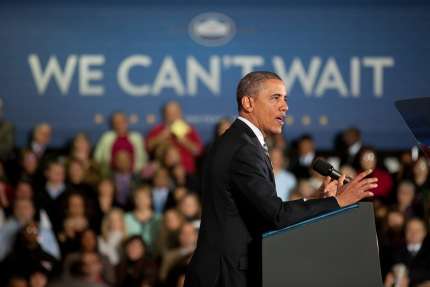We Don't Do Big Things
Why the failure of Obamacare should temper America's political ambitions.

In January 2011, when President Obama closed out his State of the Union address with a double invocation of the phrase, "we do big things," it seemed more than plausible. It seemed obviously true. During the previous two years, Congress had passed, and Obama had signed, the biggest fiscal stimulus in history, a far-reaching overhaul of financial sector regulation that included the creation of a new federal agency, and a health care law intended to reform the insurance market and bring the nation closer than ever to universal coverage.
Obama's declaration wasn't so much a promise as a boast of progress already made; under his watch, the federal government wasn't merely going to do big things—it had already done them.
Nearly three years later, the federal government's capacity for expansive action looks far more in doubt. The $800 billion in borrowed stimulus money was spent, but to uncertain and perhaps minimal or even negative effect. Many of the new financial regulations, meanwhile, have not only not been implemented, they have not been formulated. By July of 2013, fewer than 40 percent of the new rules called for by the law had been drafted and finalized.
And then there is the health care law. The October rollout of Obamacare's health insurance exchanges was nothing short of disastrous, especially at the federal level, where Washington attempted to build a network of exchanges covering 36 states.
The technical failures compound the law's policy risks: They make it less likely that insurers participating in those exchanges will achieve a sustainable risk pool with sufficient numbers of young and healthy individuals to balance out the older, sicker population.
The botched launch of exchanges also ensures that the law's already combustible politics produce an explosion, as millions of individuals find that, contrary to the president's explicit and repeated promise, their individual health plans are being cancelled—and the exchange alternatives that were supposed to be in the waiting are not accessible.
The result, at least so far, is a looming policy disaster and a political catastrophe. President Obama's job approval rating dropped to its lowest mark yet in a CBS News poll released Wednesday—settling at 37 percent, down nine points just since last month. The same poll shows a new low for the health care law as well. Obamacare has always struggled politically, but in the last month its approval rating has dropped 12 points, to just 31 percent.
The news, and thus the polls, are not likely to get better any time soon. Multiple reports have hinted that the contractors and bureaucrats in charge of righting the federal exchange technology will not hit their self-imposed end-of-month deadline. And at a congressional hearing this week, the health official in charge of exchange development revealed that as much as 40 percent of the system has yet to be built, including the payment mechanism for transferring subsidies to insurers.
The administration is now so desirous of political relief that it has turned to tweaks to the law that involve selectively not enforcing some provisions and rely on expansive claims of administrative legal authority that are not likely to hold up in court. And officials are so desperate for technical workarounds that they have turned to the insurance industry in hopes of jury-rigging an enrollment mechanism that actually functions. Is the message that the federal government can't do big things, but the insurance industry can?
There are various lessons here about the need for administrative oversight and technical competence, neither of which appear to have been sufficiently present in the launch and implementation of the health care law.
More than anything, however, this rolling bureaucratic disaster and its fallout should serve as a check on expansive political ambitions and grand visions of social change.
That goes for politicians from both parties, and for projects both foreign and domestic; as Republicans learned in Iraq, simply willing something to happen, and throwing resources at the goal, is not the same as seeing it through.
But it also goes for voters, whose hope in governmentally driven change gives those politicians license to act. Americans do many big things well, but American government doesn't. The best way to avoid future grand debacles is to agree that we won't do them together.


Show Comments (51)